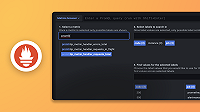Caution
Grafana Alloy is the new name for our distribution of the OTel collector. Grafana Agent has been deprecated and is in Long-Term Support (LTS) through October 31, 2025. Grafana Agent will reach an End-of-Life (EOL) on November 1, 2025. Read more about why we recommend migrating to Grafana Alloy.
This is documentation for the next version of Agent. For the latest stable release, go to the latest version.
local.file_match
local.file_match discovers files on the local filesystem using glob patterns and the doublestar library.
Usage
local.file_match "LABEL" {
path_targets = [{"__path__" = DOUBLESTAR_PATH}]
}Arguments
The following arguments are supported:
| Name | Type | Description | Default | Required |
|---|---|---|---|---|
path_targets | list(map(string)) | Targets to expand; looks for glob patterns on the __path__ and __path_exclude__ keys. | yes | |
sync_period | duration | How often to sync filesystem and targets. | "10s" | no |
path_targets uses doublestar style paths.
/tmp/**/*.logwill match all subfolders oftmpand include any files that end in*.log./tmp/apache/*.logwill match only files in/tmp/apache/that end in*.log./tmp/**will match all subfolders oftmp,tmpitself, and all files.
Exported fields
The following fields are exported and can be referenced by other components:
| Name | Type | Description |
|---|---|---|
targets | list(map(string)) | The set of targets discovered from the filesystem. |
Each target includes the following labels:
__path__: Absolute path to the file.
Component health
local.file_match is only reported as unhealthy when given an invalid
configuration. In those cases, exported fields retain their last healthy
values.
Debug information
local.file_match does not expose any component-specific debug information.
Debug metrics
local.file_match does not expose any component-specific debug metrics.
Examples
Send /tmp/logs/*.log files to Loki
This example discovers all files and folders under /tmp/logs. The absolute paths are
used by loki.source.file.files targets.
local.file_match "tmp" {
path_targets = [{"__path__" = "/tmp/logs/**/*.log"}]
}
loki.source.file "files" {
targets = local.file_match.tmp.targets
forward_to = [loki.write.endpoint.receiver]
}
loki.write "endpoint" {
endpoint {
url = LOKI_URL
basic_auth {
username = USERNAME
password = PASSWORD
}
}
}Replace the following:
LOKI_URL: The URL of the Loki server to send logs to.USERNAME: The username to use for authentication to the Loki API.PASSWORD: The password to use for authentication to the Loki API.
Send Kubernetes pod logs to Loki
This example finds all the logs on pods and monitors them.
discovery.kubernetes "k8s" {
role = "pod"
}
discovery.relabel "k8s" {
targets = discovery.kubernetes.k8s.targets
rule {
source_labels = ["__meta_kubernetes_namespace", "__meta_kubernetes_pod_label_name"]
target_label = "job"
separator = "/"
}
rule {
source_labels = ["__meta_kubernetes_pod_uid", "__meta_kubernetes_pod_container_name"]
target_label = "__path__"
separator = "/"
replacement = "/var/log/pods/*$1/*.log"
}
}
local.file_match "pods" {
path_targets = discovery.relabel.k8s.output
}
loki.source.file "pods" {
targets = local.file_match.pods.targets
forward_to = [loki.write.endpoint.receiver]
}
loki.write "endpoint" {
endpoint {
url = LOKI_URL
basic_auth {
username = USERNAME
password = PASSWORD
}
}
}Replace the following:
LOKI_URL: The URL of the Loki server to send logs to.USERNAME: The username to use for authentication to the Loki API.PASSWORD: The password to use for authentication to the Loki API.
Compatible components
local.file_match can accept arguments from the following components:
- Components that export Targets
local.file_match has exports that can be consumed by the following components:
- Components that consume Targets
Note
Connecting some components may not be sensible or components may require further configuration to make the connection work correctly. Refer to the linked documentation for more details.



